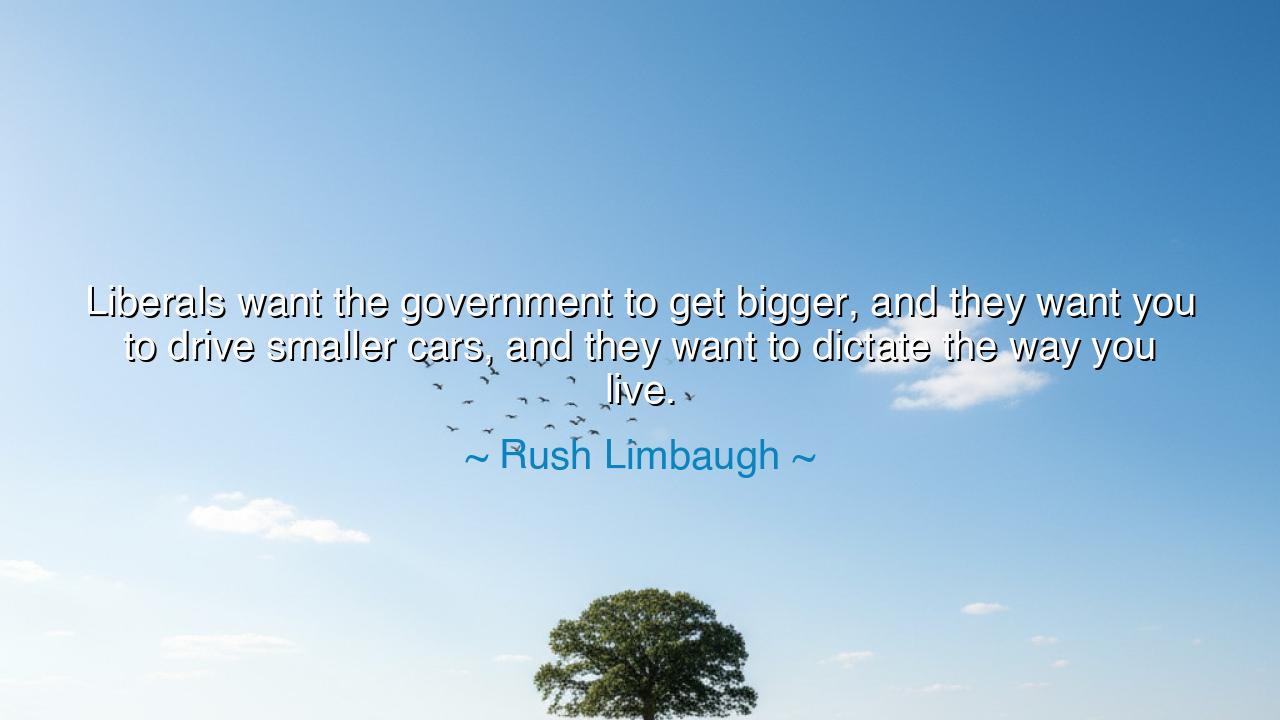
Liberals want the government to get bigger, and they want you to
Liberals want the government to get bigger, and they want you to drive smaller cars, and they want to dictate the way you live.






Hearken, children of the dawn, and ponder the words of Rush Limbaugh, a voice that stirred the hearts of many in an age of shifting powers and competing visions of liberty. He spoke thus: “Liberals want the government to get bigger, and they want you to drive smaller cars, and they want to dictate the way you live.” At first glance, these words may strike as mere political contention, yet, when heard with the ear of the soul, they echo a deeper meditation on the nature of freedom, the allure of authority, and the eternal tension between the individual and the state.
In the times when Limbaugh first rose, the air was thick with debates over regulation, environmentalism, and personal choice. To him, a growing government was no distant abstraction—it was a looming presence, a shadow that could extend into every hearth and every purse. Like the ancient emperors who sought to measure the lives of citizens with meticulous decree, he warned that the more the state expanded, the more the individual spirit risked being constrained, reshaped, or silenced. This is a truth older than modern politics, a lesson witnessed in the fall of Athens when excessive reliance on centralized authority bred both security and subjugation.
Yet Limbaugh’s words pierce beyond the machinery of government. The call to “drive smaller cars” is emblematic of a wider desire, he claimed, to dictate the manner of daily life. It is not merely the automobile, but the very rhythm of human choice that is placed under scrutiny. History, too, bears witness: consider the Parisian streets under Napoleon’s early urban reforms, where the lives of citizens were regimented in the name of efficiency and morality, leaving many to chafe against constraints that seemed invisible yet unyielding. Thus, the warning is not trivial—it is a meditation on how even the smallest impositions can accumulate into a tide that reshapes the shores of liberty.
We may see, in Limbaugh’s era and ours, a modern echo of this truth in debates over environmental mandates, health regulations, and the architecture of public spaces. Each rule, well-intentioned or otherwise, carries the weight of choice curtailed. The philosopher in us must ask: at what point does guidance become coercion? At what moment does the scaffolding of the state risk becoming a cage? These questions are as old as the deliberations of the Roman Senate, where the tension between collective welfare and personal liberty was weighed with anxious care.
Consider the tale of the Berlin Wall, a stark monument to authoritarian control. It began as a series of small restrictions, curtailments of movement, curfews, and bureaucratic red tape. Citizens, initially compliant with minor inconveniences, awoke one day to find a concrete and steel barrier severing families, limiting commerce, and regulating life with brutal finality. Limbaugh’s warning is a whisper of this larger story: that a state, however well-intentioned, may overreach when unchecked, and the price is the freedom of the soul.
Yet we must not perceive these words as mere prophecy or lamentation. They are a call to vigilance, a summons to guard the sacred space of autonomy. Every citizen, every heart, must balance engagement with the state against the preservation of selfhood. History lauds those who navigate this balance wisely, from the framers of the American Constitution to dissidents under totalitarian regimes. Each acted not with reckless defiance, but with measured courage, aware that the liberty of one is intertwined with the liberty of many.
The lesson, therefore, is clear: cherish the freedom of choice, and recognize that incremental encroachments on daily life—be they in the form of legislation, regulation, or societal expectation—deserve scrutiny. Practice discernment in the consumption of laws and policies, always asking: does this serve the collective good without dimming the light of personal liberty? The warrior of the spirit must act as both participant and guardian, engaging with society while defending the inner realm of self-direction.
Practical actions emerge from this reflection: remain informed and critical, understanding the motives behind policy and governance; exercise your autonomy consciously, whether in consumption, travel, or lifestyle; engage in civic life not as a passive subject, but as an active steward of liberty; and cultivate a mind and heart resilient to overreach, ever aware that true freedom is both a gift and a responsibility. In this way, Limbaugh’s words, though spoken in the turbulent air of political contention, become timeless guidance for those who wish to live fully and freely, like the heroes of old, whose vigilance safeguarded both their cities and their souls.






AAdministratorAdministrator
Welcome, honored guests. Please leave a comment, we will respond soon